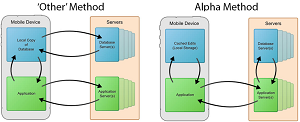News
Alpha Software Features Built-In Offline Support for Mobile Apps
Alpha Software Corp. addressed "the offline mobile challenge" with a low-code mobile development solution that builds in offline support so users can effectively use data-driven apps even when there's no network connectivity.
The offline mobile problem was described by Forrester Research in a report that stated "our experience shows that offline support is the mobile app feature continually underscoped by developers and over-simplified by stakeholders."
Numerous other approaches are designed to handle data changes offline and then synchronize with back-end servers once connectivity is restored, but Alpha claimed its Alpha Anywhere 3.0 is the first development and deployment environment to include such built-in offline support for creating offline-capable transactional business apps "without added time or cost."
As identified by CTO Dan Bricklin, some of the major issues involved in offline mobile apps include persisting local data such as unsynchronized transactions and app state; transferring transactions back to the enterprise database; managing the "peculiarities of mobile wireless connectivity"; and providing information about the app's workings to the user.
 [Click on image for larger view.]
Contrasting approaches to offline mobile apps (source:Alpha Software Corp.)
[Click on image for larger view.]
Contrasting approaches to offline mobile apps (source:Alpha Software Corp.)
The Alpha approach works with HTML5 Web-based mobile apps only, as opposed to native or hybrid apps. As Bricklin explained, alternative approaches to intermittent connectivity typically used with native or hybrid apps involve saving changes to a local on-device database that synchronizes with the back-end database when connectivity is available. In these approaches, often implemented as native apps, the local replica database communicates directly with the back-end servers without the app necessarily knowing about the synchronization.
In Alpha Anywhere, data changes are stored in "local storage," a standard HTML5 feature. When connectivity is restored, a user can click a button to make the app communicate with a back-end application server that in turn communicates changes to the back-end database servers.
"This is exactly how a connected application would operate -- which is critically important -- because it means that disconnected applications and connected applications essentially work in the same manner," Bricklin said in release notes. "This means that little or no changes have to be make to an application to make it 'disconnected.'"
Note that support for HTML5 local storage -- sometimes called Web storage -- varies by browser versions. It's typically limited to 5 MB of storage, though some browsers allow users to increase this limit and some have a 10 MB cap.
Alpha said its software also provides data record conflict resolution that is more sophisticated than the standard "last in wins" algorithm, which may not be appropriate in all cases. To resolve conflicts that may arise when two users change the same database record while offline, the software alerts the user, who can choose which change should actually be used.
The company's model-driven, "low-code" approach to building cross-platform mobile apps uses domain models -- such as tree diagrams or flow charts -- presented in a visual format as opposed to line-by-line hand coding. The visual tools allow for adding dialog boxes and controls, positioning elements and other coding tasks, with provisions for more detailed customization.
Bricklin said this lets developers with limited skills more quickly create front-end and back-end business apps, while allowing hand-coding by programmers with higher-level skills when needed, using languages such as JavaScript, CSS, SQL, C# and Basic. Visual genies and builders are also available to help with custom coding.
Bricklin, a well-known industry figure who co-created the first spreadsheet, VisiCalc, discusses the Alpha low-code approach in detail in a video.
Alpha Anywhere 3.0 includes more than 70 improvements, the company said. In addition to the new offline capabilities, it adds support for MongoDB and other NoSQL databases, the use of Active Directory in its security framework, social network logins, client-side templating, conversion of SQL data into hierarchical JSON data sets and more.
The software also features improvements to its PhoneGap Build integration, introduced in version 2.0. The PhoneGap technology allows access to native features of a smartphone, such as accelerometers, device storage and cameras.
Alpha Anywhere 3.0, available for a 30-day trial, has various pricing options.
About the Author
David Ramel is an editor and writer at Converge 360.